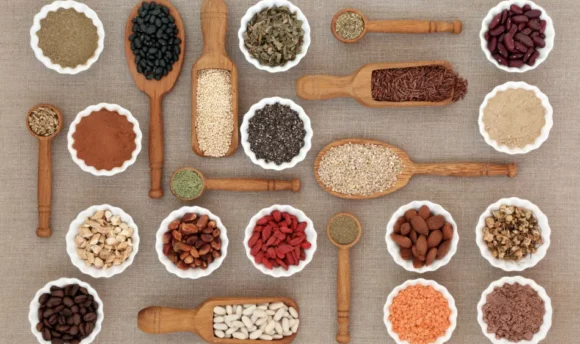Is Greek Food Healthy? Nutrition Facts, Benefits, and Recipes to Try
Greek foods are full of color and flavor, but are they good for you? Uncover the facts about the Greek diet and decide for yourself if you should include these foods in your meal plan.

The traditional Mediterranean diet receives high praise as one of the world’s most healthy diets. It has long been associated with disease prevention, healthy aging, and longevity. Traditional Greek food comprises many elements of Mediterranean cuisine while creating unique dishes.
Now, you might wonder if the Greek diet is just as promising as the Mediterranean one. Will Greek food make you age better, live longer, and prevent chronic diseases?
Keep reading as we delve deep into the Greek diet and study its effects on human health.
Is Greek Food Healthy?
Greek food is absolutely healthy. The Mediterranean diet is considered one of the best diets on the planet, and it is based on the traditional Greek diet. It’s full of healthy monounsaturated fats, fresh fruit and vegetables, whole grains, lean proteins, and abundant antioxidants.
The Mediterranean diet describes the dietary pattern of Greece, Italy, Spain, and other countries along the Mediterranean Sea. The diet is linked to lower cardiovascular risk, a lower mortality rate, reduced risk of heart disease, and chronic degenerative diseases like cancer.
Adding Greek foods to your meal plan can help build a well-balanced diet rich in nutrients to support systemic health. Best of all, Greek food is bursting with flavor and variety, creating delicious dishes whether cooking at home or visiting a Greek restaurant.
Of course, not all Greek food is healthy. You should still limit your intake of fried food and Greek junk food.
7 Key Ingredients Found in Greek Food
Thanks to some staple ingredients, the traditional Greek diet is rich in antioxidants, fiber, healthy fats, and various vitamins and minerals. If you’re wondering what to expect from Greek cuisine, here are 7 popular ingredients you’re likely to find in traditional Greek dishes.
#1 Olive oil
Heart-healthy olive oil is the star ingredient of the Mediterranean diet and a staple in Greek cuisine. It’s linked to good heart health because of its monounsaturated fat content and may support the prevention and management of various health disorders.
Olive oil is particularly rich in an unsaturated omega-9 fatty acid called oleic acid, which may reduce inflammation and cancer risk. You’ll also find plenty of olives in Greek food culture.
#2 Whole grains and legumes
In classic Greek dishes, you’ll often find barley, buckwheat, bulgar, brown rice, millet, rye, and other whole grains. Eating these foods can help lower blood pressure and blood cholesterol levels, aid blood sugar control, and decrease your type 2 diabetes risk.
Popular legumes in Greece include beans, chickpeas, lentils, and split peas. You’ll often find them in casseroles, soups, and stews, which is great because legumes are highly nutritious. They have carbs, fiber, protein, B vitamins, iron, magnesium, and various other minerals.
#3 Low-fat cheese and yogurt
The Greek and Mediterranean diets favor low-fat dairy products, including cheese and yogurt. These varieties are lower in calories and saturated fat than their full-fat counterparts, making them better for your heart and more beneficial for a weight loss journey.
Greek yogurt containing probiotics is excellent for your gut because the friendly bacteria help support a healthy gut microbiome. It’s also a good choice for people with diabetes as it has fewer carbs and more protein than other yogurts.
#4 Vegetables
Fresh Greek food is full of fresh vegetables that create nutritious, rainbow-colored dishes. Popular veggies include tomatoes, green beans, eggplant, potatoes, and leafy green vegetables like chard, collard greens, and spinach.
Vegetables are essential to any diet since they’re packed with vitamins, minerals, and fiber. From the beloved Greek salad to spinach pie, getting plenty of greens into your diet is easy.
#5 Lean protein
The Greek diet mostly contains plant-based protein from beans, chickpeas, nuts, and seeds. It does include lean meats in moderation, such as beef, lamb, pork, and poultry.
You can also get your protein intake and more good fatty acids from fatty fish, as anchovies, herring, mackerel, and sardines are Mediterranean staples.
#6 Fruits
Greeks consume a high intake of fruits, with apricots, cherries, oranges, watermelon, and more making a regular appearance. Fruit is vital for your diet because it contains all kinds of nutrients, including dietary fiber, folate, magnesium, potassium, vitamin A, and vitamin C.
You won’t struggle to find a classic fruit salad when venturing through Greece. You can make a quick snack or dessert at home by combining your favorite fruit with a helping of Greek yogurt.
#7 Herbs
The Greeks are no strangers to flavorsome fresh herbs. Oregano, bay leaf, dill, fennel, mint, parsley, sage, and thyme are popular herbs in Greek cooking, as these are readily available in the climate. Most dishes tend to rely on herbs rather than spices.
Consuming herbs can help you stay healthy, as these fragrant plants have some powerful health benefits. They can protect against acute and chronic diseases due to their antioxidant, anti-inflammatory, and anticarcinogenic properties.
Oregano, arguably one of the most used herbs in the Greek diet, is packed full of phenolic compounds. It may reduce inflammation, improve gastrointestinal health, and fight bacteria.
7 Health Benefits of Greek Food
Healthy Greek food has many health benefits, from strengthening your heart to supporting mental well-being. You can’t go wrong with Greek cuisine if you want to eat a healthy diet. Here’s how it can help your body:
#1 Good for your heart
The Greek diet emphasizes meals that center around healthy monounsaturated fats, whole grains, vegetables, fruits, fish, low-fat dairy, beans, and legumes. Research suggests that these are among the best foods to lower cholesterol and decrease your risk of heart disease.
#2 Improves digestion
Eating Greek foods regularly can improve digestive health since many are rich in high-quality fiber. Getting enough fiber supports gut function by promoting healthy bowel movements and preventing constipation. Increasing your intake is one of the best gut health hacks to try now.
#3 Boosts metabolism
You might get a metabolism boost from foods like garlic and chili peppers – two foods known to raise your metabolic rate and slow your appetite. The high protein content can also increase your metabolism and the number of calories you burn throughout the day.
#4 Wards off type 2 diabetes
The Mediterranean diet as a whole is associated with a reduced risk of type 2 diabetes. That’s because many of the common foods have properties to improve insulin sensitivity, regulate blood sugar, and reduce inflammation in the body.
People with diabetes can benefit from a plant-based diet, and since Greek cuisine is heavy in fruits, vegetables, and plant proteins, it’s an excellent choice.
#5 Helps with weight loss
You can lose excess weight with the Greek diet because it is low in calories, added sugars, and refined carbs. Furthermore, it’s brimming with protein, fats, and fiber – filling nutrients that aid appetite control and regulate hunger hormones.
#6 May prevent cancer
Filling up on Greek food may reduce your overall cancer risk. It features all the right food groups to protect against cancer, notably fruits, vegetables, legumes, and whole grains. These foods are rich in powerful antioxidants that protect cells from harmful free radical damage.
#7 May ease depression
Good nutrition can help counter depression and poor mental well-being, as studies show that diet can significantly influence depression symptoms. Healthy eating patterns, like those of the Mediterranean and Greek diets, are linked to better mental health than the Western diet.
Nutrition Facts of Greek Food
All you need to do is look at the nutrition facts to conclude that Greek food is healthy. Getting a range of nutrients from your meals and snacks is important to keep your mind and body healthy and functioning optimally.
Here are some of the benefits of the Greek diet:
- Rich in healthy fats from olives, olive oil, fatty fish, and avocado
- Low in saturated fats as it limits butter, full-fat cheese, red meat, and processed foods
- High in protein from lean meats, legumes, seafood, and feta cheese
- Moderate amount of carbs from unrefined and fiber-rich foods
- Rich in dietary fiber to support gut health, control blood sugar, and promote regularity
- High in vitamin C from lemons, lemon juice, oranges, and tomatoes
3 Healthy Greek Foods to Make at Home
Are you ready to try some homemade Greek food?
You can find the classics at almost every Greek restaurant, but making your own dishes at home using local foods is always fun. Here are three simple recipes to get a taste of the Greek and Mediterranean cuisines.
#1 Greek salad
You simply can’t go wrong with a classic Greek salad. It comprises a handful of key ingredients; feta cheese, cucumber, tomato, red onion, and olives.
Ingredients
- 4 large vine tomatoes, chopped into wedges
- 1 medium cucumber, seeded and roughly chopped
- 1/2 red onion, thinly sliced
- 10–20 Kalamata olives
- 85g feta cheese, chopped into chunks
- 1 tsp fresh oregano
- 4 tbsp extra virgin olive oil
Instructions
- Add all the ingredients to a large bowl and combine.
- Lightly season with salt and pepper if preferred, and enjoy!
#2 Greek hummus
Hummus is a chickpea-based dip that’s great for weight loss and makes an ideal diabetes-friendly snack.
Ingredients
- 400g canned chickpeas
- 3 tbsp tahini
- 4 tbsp extra virgin olive oil
- The juice from 1 large lemon
- 2 garlic cloves, minced
- 2 tbsp water
- ½ tsp sea salt
- ½ tsp ground cumin
- Dash of paprika
Instructions
- Add the tahini and lemon juice to a blender and pulse for approximately 1 minute. Then, add the chickpeas and blend until the minced.
- Gradually add the garlic and olive oil while pulsing the mixture. Blend until thoroughly combined and smooth in texture.
- Add the salt and cumin to season. If the mixture is too thick, add the water a little bit at a time to alter the consistency.
#3 Tzatziki dip
Tzatziki is a yogurt and cucumber dip and a Greek favorite that goes great with gyros and almost any meat dish.
Ingredients
- 1½ cups plain Greek yogurt
- 1 medium cucumber, seeded and coarsely grated
- 2 small garlic cloves, minced
- 2 tbsp extra virgin olive oil
- ¾ tsp sea salt
- ¼ tsp fresh black pepper
- 2 tbsp fresh mint, finely chopped
Instructions
- Combine all ingredients in a mixing bowl and mix thoroughly. Do a taste test and add more salt and pepper if necessary.
- Cover and place in the fridge until ready to eat. Finish with a drizzle of olive oil.
FAQs
Greek food is so healthy because it’s full of superfoods and minimally processed ingredients. You can get heart-healthy fats, lean protein, whole carbs, fiber, antioxidants, and more from countless Greek dishes to create a nutritionally-balanced diet.
Consuming Greek food can help you lose weight because it tends to be lower in calories, saturated fat, and refined carbs but higher in healthy fats, fiber, and protein. These are essential nutrients to keep you feeling full and energized so you can hit your goals.
The Greek diet, like the Mediterranean diet, is not high in carbohydrates. It contains moderate carbs from whole food sources, such as beans, rice, pita bread, and other whole grains. Some dishes, of course, are loaded with carbs, including the Greek dish Moussaka.
A Word From a Nutritionist
Greek food is a fantastic choice if you want to implement a healthy diet. The principles of the Greek diet match those that health professionals worldwide recommend for maintaining optimal health – superfoods, including vegetables, fruits, fiber, fish, whole grains, and legumes.
It’s also low in processed foods and added sugar, making it easier to balance junk food and healthy eating. Those who consume this diet may experience healthy brain aging, stronger bone and heart health, greater weight control, and healthy blood sugar and cholesterol levels.
Of course, not all Greek food is healthy. Opt for the homemade variety so you can control the nutrient content, as pre-made meals may contain added salt and sugars.
Conclusion
Greek food is exceptionally healthy. It favors whole foods over everything else, making it low in calories, saturated fat, and sugar. With staples like oregano, wild greens, fresh fish, and olive oil in almost every Greek dish, you can ensure you receive good nutrition day after day.

















































 Select your language:
Select your language: 








